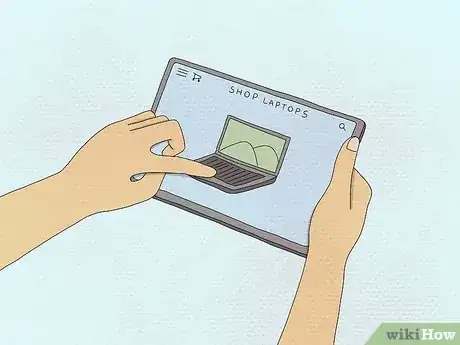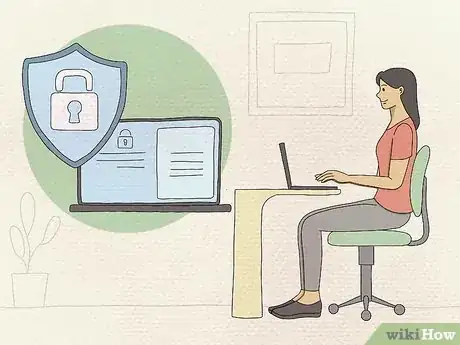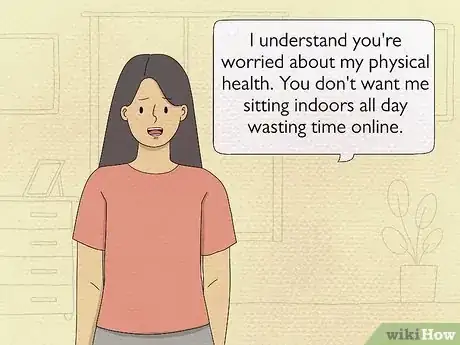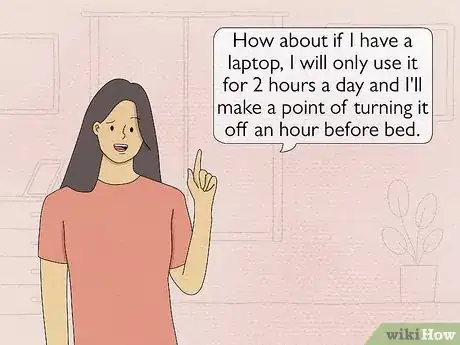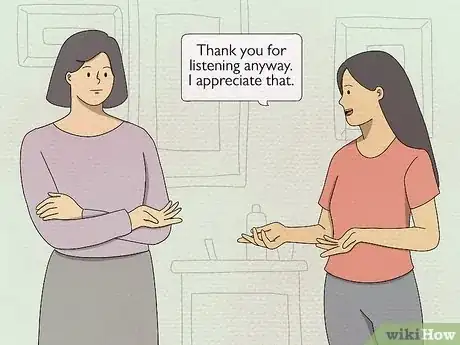This article was co-authored by Chandler Chang, PhD. Dr. Chandler Chang is a Licensed Clinical Psychologist, the Founder & Owner of Golden Hour Therapy and Therapy Lab, and a Clinical Instructor at the University of Southern California. With nearly 20 years of experience, she specializes in providing evidence-based, science-backed treatments to toddlers, children, teens, families, and adults to target specific mental health problems or cultivate mental wellness. Dr. Chang earned a BA from Princeton University and a PhD in Psychology from The University of Georgia. She completed UCLA's pre-doctoral internship and trained at NYU’s Child Study Center and UGA Regents Center for Learning Disorders.
This article has been viewed 86,382 times.
There are many reasons you may want a computer or laptop of your very own. Having your own laptop can give you a sense of personal freedom and independence. Your parents, however, may worry about safety, or may feel a laptop is very expensive. Work on building a case for yourself. Identify the benefits of having your own laptop, such as the ability to work on papers and schoolwork. Ask your parents respectfully, and listen to their perspective. If they say "No," try to see if you can find a compromise. If you have to accept a "No" for now, accept this with grace. If your parents see you can maturely listen to the word "No," they're more likely to change their minds regarding a laptop in the future.
Steps
Building Your Case
-
1Find some affordable laptops. Your parents are unlikely to buy you an expensive laptop, especially if you've never had a laptop before. Before asking your parents for a laptop, do some research. Find some affordable laptops with good reviews. You can read reviews online or in magazines about computers and electronics. If your parents see you've made a plan, they may be more likely to say "Yes" to your request.
- Many of the more expensive laptops cost over $1,000, but you can find a lot of suitable laptops for under $500. Think about your needs. Pick a laptop you can use for things your parents would approve of, like schoolwork. You can, for example, look for a laptop with built in word processing features.
- Try to find a laptop that's durable. Your parents may feel it would be a bad idea to buy you a laptop as you may break it. Look for laptops with a reputation for withstanding a lot of damage.
- Find a laptop that does not require a lot of maintenance. Your parents won't want to buy you something that will be breaking down a lot.
-
2Identify the benefits of a laptop. You want your parents to see how a laptop can help you. They're unlikely to invest a lot of money in something you'll just use recreationally. Find reasons your laptop can help you be more responsible.[1]
- Jot down the academic benefits of a laptop. You can talk about how a laptop can help you prepare for school. You can show your parents software and games that help you learn subjects like math, English, and science.
- See if there are any apps you can find that help you maintain a schedule. Maybe there's a to-do list app that could help you keep track of your homework, for example.
Advertisement -
3Address potential concerns. Your parents may have reservations about getting you a laptop. They may worry that it will distract from school or have safety concerns. Think of ways you can counter these concerns when asking for your laptop.[2]
- Your parents may worry about you spending too much time in front of a screen, which can cause problems with eyesight and posture. Your parents may also worry you'll become inactive if you have a laptop. You can tell them you'd be willing to only use the laptop for a set time each day.
- You can also make sure you know how to use the laptop correctly. Promise your parents you'll keep proper posture when using your laptop. You should also promise to look away from the screen every 20 minutes when using the computer, which is healthier for your eyes.
- Also, let them know you'd be happy to let them install security software and parental controls to make sure you're using the laptop safely.
-
4Show you're responsible. Your parents will be more willing to give in to a request if they think you've earned it. As you prepare to ask your parents, work on showing how responsible you are. A high level of maturity and personal responsibility will reflect well on you when making the request.[3]
- Find small ways to show you're responsible. Clean your dishes after dinner without being asked. Do a small household chore for one of your parents.
- If you show that you embrace responsibility, this will make you look mature. This can reflect highly on you when you ask for a laptop.
-
5Choose a good time to talk. Once you feel your case is ready, find a time to talk. You want to make sure you pick the right time to stop your parents to ask. A time when one or both of your parents are stressed is not a good time.[4]
- Think about when your family has free time throughout the day. If Tuesday nights are always packed, do not ask then. However, maybe your parents usually have downtime Wednesdays shortly after dinner. This may be a good time to ask.
- Try to eliminate distractions when asking. Wait until the television is turned off and neither one of your parents are busy with electronic devices like cellphones.
Having the Conversation
-
1Practice what to say first. If you're nervous, practicing can help. Stand in front of a mirror and rehearse what you plan to say to your parents. Restate your case several times until you can easily sum up why you want a laptop. You may be nervous during the actual conversation, so rehearsing beforehand can help.
-
2Stop your parents to talk. Beginning the discussion is simple. While you may be nervous going in, a few quick words can start the conversation. For example, say something like, "Mom, Dad, there's something I wanted to talk to you about. Do you have a minute?"[5]
-
3Be direct. Asking directly will show you're mature, and help the discussion progress effectively. Get to the point right away, and provide the details you gathered that help make your case.[6]
- Start off the conversation introducing what you want. For example, "I would really like a laptop or computer of my own."
- From there, state your case. Bring up the benefits of a laptop. For instance, "I think it could help with schoolwork. Sometimes, I have papers to write, but Sam is using the computer for her homework. My own laptop would just make that easier."
- Remember to address any potential concerns. For example, "I know you might worry about me being locked in my room all day, but I would be happy to limit my computer time to a few hours each day if you want."
-
4Ask with gratitude. If you come off as entitled, this may make your parents more likely to say "No." When asking, make sure to show your parents appreciation. You want them to feel valued when you ask them for a laptop.[7]
- Express how much you appreciate what your parents do. You can say something like, "I know how hard you guys work to afford everything I have. I really appreciate that, and I know a laptop is not cheap."
- This way, you'll sound mature and grateful. Your parents will know that you've really thought a lot about why you need a laptop and are not just asking on a whim. You understand how much these items cost.
-
5Listen to your parents' perspective with an open mind. Your parents may hesitate. They may have certain concerns that they need addressed before agreeing to a purchase. Instead of getting hostile, remain calm and listen.[8]
- Your parents probably have a reason for saying "No" or for expressing uncertainty. Try to understand this reason. Your parents will appreciate knowing their voices have been heard in the conversation.
- You can try briefly summarizing what your parents said to make it clear you understood. For example, "I understand you're worried about my physical health. You don't want me sitting indoors all day wasting time online."
-
6Avoid arguing or whining. You never want to steer the conversation into an unproductive direction. Do not argue with your parents or complain. This will only make your parents less likely to listen to you. If you feel the conversation is not getting anywhere, end the conversation and do something to blow off steam. Go for a walk, for example, instead of blowing up at your parents.[9]
Dealing with Setbacks
-
1Offer to do something in return. If your parents say "No" right away, see if you can offer something in return for the laptop. There may be a deal your parents are willing to strike. This way, you can eventually earn the laptop.[10]
- For example, maybe your parents are concerned with your grades in a particular course. You could offer to bring up your math grade in exchange for a new laptop.
- Your parents may also be worried about money. Try offering to put in some money of your own from an after school job in exchange for a new laptop.
-
2Ask your parents politely why they don't want you to have a laptop. You do not want to be argumentative or confrontational with your parents. However, it can help to know why they're saying, "No." This way, you can potentially address any issues.[11]
- Ask politely. Do not say something like, "This is so unfair! Why can't I have a laptop?"
- Instead, try something like, "I understand you don't want me to have a laptop. Can you tell me the reason why?"
-
3See if you can find a compromise. Offer a compromise in as mature a manner possible. If you present a clear, concrete compromise, your parents may be able to meet you halfway.[12]
- Make the terms clear. Do not say, "If you let me have a laptop, I won't use it that often." Instead, go for specific timeframes. For example, "How about if I have a laptop, I will only use it for 2 hours a day and I'll make a point of turning it off an hour before bed."
- You can also suggest appropriate punishments in the event you break the conditions of the compromise. For example, "You can take the laptop away for a week if I use it for more than two hours in one day."
-
4Accept a "No" for now. Even if you ask calmly and maturely, your parents may still say, "No." A laptop is expensive and your parents may have many concerns regarding you using one. In the event you get a "No" for an answer now, accept as much. Say something like, "Thank you for listening anyway. I appreciate that."[13]
- You can try asking again in a few months. If your parents see you're mature enough to gracefully accept a "No," they may reconsider in the future.
Community Q&A
-
QuestionIts almost summer, and my birthday is in July 29. What do I do to get one early?
 Community AnswerYou can ask your parents for an early birthday present. You may end up not getting presents on your actual birthday, but if you have your heart set on a laptop, this could be worth it.
Community AnswerYou can ask your parents for an early birthday present. You may end up not getting presents on your actual birthday, but if you have your heart set on a laptop, this could be worth it.
References
- ↑ http://www.allaboutvision.com/parents/children-computer-vision-syndrome.htm
- ↑ http://www.allaboutvision.com/parents/children-computer-vision-syndrome.htm
- ↑ http://www.huffingtonpost.com/hanaan-rosenthal/advice-for-teens_b_2037523.html
- ↑ http://kidshealth.org/en/teens/talk-to-parents.html#
- ↑ http://kidshealth.org/en/teens/talk-to-parents.html#
- ↑ http://kidshealth.org/en/teens/talk-to-parents.html#
- ↑ http://www.huffingtonpost.com/hanaan-rosenthal/advice-for-teens_b_2037523.html
- ↑ http://kidshealth.org/en/teens/talk-to-parents.html#
- ↑ http://kidshealth.org/en/teens/talk-to-parents.html#
